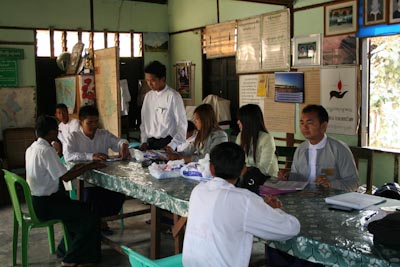After 8 weeks, UNFPA, in collaboration with the Department of Population, has made the final payments to 124,317 trainers, supervisors, enumerators, township officers and support staff. It took a team of at least 15 people, almost nine weeks, working seven days a week to check that the names of the census staff matched the details and names in the master database.
For enumerators, a township payment file was created to cross check requests for payments from Township Census Officers against a computerised master list that was created at the time of training. Where people were not on the master list or some of the details mismatched, for example, digits in the National Registration Card, telephone number or part of the name were incorrect, then the request for payment was sent to a specially contracted financial agency for further verification before entry into the master database. They then checked various documents including District Verification Rolls and District Training Attendance Sheets, and called Township Census Officers and the payee for clarification on the cause for the mismatch. Once all checks had been made, the payment could go ahead. Given that 124,317 census staff had to be paid manually and systematically, it took time and meant that some townships were paid earlier and others later.
One of the first people to be paid was Daw Khin Win Mar, a primary school teacher from Shan North, Kyaukme Township, who was one of the census enumerators. She said: “The Township Immigration Officer really supported me. I enumerated 400 households and was paid on time”. One of the last people to be paid was Daw Baw Hwe Tee, a secondary school teacher from Chin State, Hakha, and a census enumerator. While mentioning that her wait for payment was long, she also said: “The family was waiting for us to arrive as they had been informed we were coming. As I can speak Myanmar and Chin, the enumeration process went well. I visited 289 households”.

UNFPA recognises this meant a waiting time for most of the census staff, while acknowledging the immense contribution that trainers, supervisors and enumerators have made to the census being largely successful across the country. As Janet Jackson, Country Representative, UNFPA Myanmar, emphasised: “The payment process took time to ensure that the right people got paid the right amount”.
It was an enormous task to ensure that all census staff were paid. This was done in two phases – training and after enumeration. Using the bank was a safe way to pay out small amounts of money that added up to a large amount. Close to US$20 million dollars. It was also a secure way to move large amounts of funds to every part of the country.
From early June until the last week of July, every Thursday UNFPA would send Kanbawza Bank (KBZ) a list of all those to be paid in a given township. Every week, around 50 township enumerators, supervisors and helpers received their payments. Township officers did a great job in getting the word out to census staff so that they came to the bank on time. KBZ, from their 160 branches, went out of its way to set up mobile banking facilities to ensure that payments reached census staff in a total of around 300 townships. A few places, around 25 in total, were too remote and difficult for KBZ to reach, so UN agencies and UNFPA's partners helped out by physically taking the payments to the census people. Township Census Officers also helped in distributing the funds to the enumerators in a small number of remote places.


